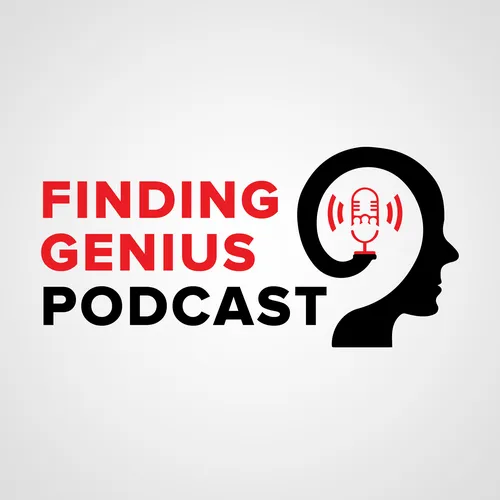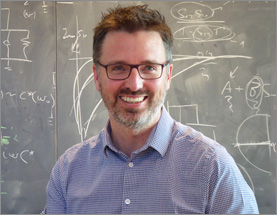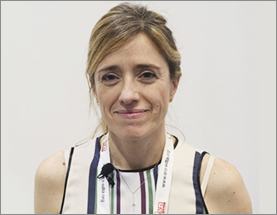
Finding Genius Podcast
Podcast interviews with genius-level (top .1%) practitioners, scientists, researchers, clinicians and professionals in Cancer, 3D Bio Printing, CRISPR-CAS9, Ketogenic Diets, the Microbiome, Extracellular Vesicles, and more.
Subscribe today for the latest medical, health and bioscience insights from geniuses in their field(s).
- Update frequency
- every day
- Average duration
- 32 minutes
- Episodes
- 4192
- Years Active
- 2016 - 2025

Is the Quantum Effect in Nanotechnology Compatible with Gravity? Gary Steele Thinks It Is
Professor Gary Steele works with quantum circuits and the compatibility of quantum mechanics with gravity through vibration and oscillation. In this podcast he explores
- How quantum circuits functi…

Effects of Garbage on the Environment and Ecology of Rivers with Timothy Hoellein
Aquatic ecologist Timothy Hoellein studies the impact of trash on aquatic ecology and biodiversity. He tells listeners
- How he's attempting to measure the movements of different materials in the flo…

Nephrologist Maria Jose Soler Addresses Role of ACE2 in Preventing Lesions in Diabetic Kidney Disease
Spanish nephrologist Mari Jose Soler studies diabetic kidney disease and diabetic neuropathy of the kidney, which is the primary cause of renal disease. She explains
- How the angiotensin converting …

COVID-19: The Heart of the Matter with Dr. Clive Svendsen and Dr. Arun Sharma
Two guests join the show today: Dr. Clive Svendsen, Director of the Cedars-Sinai Board of Governors Regenerative Medicine Institute, and postdoctoral fellow Dr. Arun Sharma. In this episode, you wil…

Exploring the Relationship Between Epigenetics and Cancer with Yael David, PhD
Assistant professor at Weill Cornell Medical College and head of the Yael David Lab at Memorial Sloan Kettering Cancer Center, Yael David, joins the podcast for a second time. In this episode, you w…

Importance of Macroeconomics and World Finances in the Time of COVID with Lori Leachman
Bio:
Professor Leachman is interested in studying the subjects of international trade, exchange rates, fiscal policy, and international macroeconomics. In conducting her research, she often incorpora…

Marine Ecosystem of Cnidarians and Algae: Monica Medina Munoz and How Corals Get Their Color
The phylum of cnidarians includes corals, anemone and jellyfish and these species' symbiotic relationship with algae is a classic example of relationships in nature ecology and evolution. Professor …

Bacterial Behaviors—Scott Anderson, Author of The Psychobiotic Revolution: Mood, Food, and the New Science of the Gut-Brain Connection
Science journalist and author of a revolutionary book on psychobiotics shares compelling insight on the latest research in microbiome and gut-brain connection research.
Tune in to discover:
- In what…

Mapping Metastasis with Sakari Vanharanta, MD, PhD
Dr. Sakari Vanharanta is a principal investigator at MRC Cancer Unit, University of Cambridge, where he studies cancer metastasis.
In this episode, you will learn:
- What the seed and soil hypothesis …

Three Dimensions with Optical Coherence Tomography: Dr. Richard Rapoza Talks Technology
Abbott Divisional Vice President of Vascular Clinical Development, Dr. Richard Rapoza, tells listeners about a newer technology for vascular health: optical coherence tomography (OCT). He discusses …

Circadian Rhythm Cancer Treatment with Brian Altman
Cancer cells disrupt the body's circadian clock. Researcher Brian Altman works to understand why and how this happens and what therapeutic findings may result. He tells listeners
- How our 24-hour c…

Molecular Mechanisms of Aging with Aditi Uday Gurkar
Professor Aditi Uday Gurkar asks why the aging process produces such disparate results under the same chronology for different people. Her research investigates
- How DNA damage reprograms a cell's …

Resistant-Busting Drugs for Parasites with Richard J. Martin
Researcher Richard J. Martin works predominantly on filarial parasites and how to develop drugs with the best parasite cleanse ability that can evade resistance. He explains
- How various filarial p…

Missing Heritability and the Human Microbiome: Gavin Douglas Discusses the Relationship
Gavin Douglas and colleagues published a paper assessing microbiome research and assertions that the human microbiome explains missing heritability in nature. He discusses this issue and explains
- …

Understanding Our Era of Biological Evolution: Eugene V. Koonin Shares His Knowledge
Computational biologist and evolutionary genomics researcher Eugene Koonin touches on several timely topics about biology, evolution, and what computational biology can teach us. In this podcast, he…

The Technology Gap with Developing Countries: Eric Verhoogen Researches Industrial Development
Tying the importance of economics to technological innovation is key to advancing developing countries. Eric Verhoogen’s research asks why firms in industrial countries aren’t adopting technologies …

On the Origins of COVID-19 with An Award-Winning Foreign Correspondent
Ian Birrell is a contributing editor of The Mail on Sunday, has a weekly column in the i newspaper, and has written for a number of publications, including The Times, The Washington Post, the Daily M…

Characterizing Cancer: Quantgene’s Jo Bhakdi Talks Cutting-Edge Data Analysis for Early Detection
Returning guest Jo Bhadi discusses using new platforms and technologies to predict cancer probability as well as what he’s learned about how cancer evolves. He also discusses how Quantgene seeks to s…

Key for IBD: Early Diagnosis and Prevention with Jean-Frederic Colombel
Researcher Jean-Frederic Colombel has studied Inflammatory Bowel Disease treatment (IBD) for about forty years. He explains for listeners
- What complications occur with Crohn's disease and ulcerati…

Looking at the Dark Underbelly of the Market System with Anton Korinek
As an associate professor in the Department of Economics at the University of Virginia, Anton Korinek studies macroeconomics and international financial stability. He shares details of his work and h…